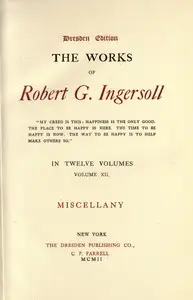"Illustrations of Universal Progress: A Series of Discussions" by Herbert Spencer is a deep exploration of progress and evolution during the 1800's. The author presents a wide-ranging philosophical view connecting biology, psychology, sociology, and morality. Spencer is dedicated to outlining the rules guiding change and growth in both nature and society. The book starts by challenging common ideas about progress, claiming true advancement comes from detailed and varied changes in areas like social, geological, and biological development, all changing from simple to complex. Spencer highlights evolution as a key idea, believing it affects not only living things but also all forms of existence, suggesting a major, universal rule controls this forward movement and encouraging readers to explore Spencer's complex philosophical questions.

Illustrations of Universal Progress: A Series of Discussions
By Herbert Spencer
Discover how everything from societies to living beings evolve from simple beginnings to complex structures through a universal force.
Genres
Released
2012-06-12
Formats
epub
mobi
epub (images)
epub3 (images)
mobi (images)
txt
Free Download
Summary
About the AuthorHerbert Spencer was an English polymath active as a philosopher, psychologist, biologist, sociologist, and anthropologist. Spencer originated the expression "survival of the fittest", which he coined in Principles of Biology (1864) after reading Charles Darwin's 1859 book On the Origin of Species. The term strongly suggests natural selection, yet Spencer saw evolution as extending into realms of sociology and ethics, so he also supported Lamarckism.
Herbert Spencer was an English polymath active as a philosopher, psychologist, biologist, sociologist, and anthropologist. Spencer originated the expression "survival of the fittest", which he coined in Principles of Biology (1864) after reading Charles Darwin's 1859 book On the Origin of Species. The term strongly suggests natural selection, yet Spencer saw evolution as extending into realms of sociology and ethics, so he also supported Lamarckism.
Total Reviews
10.0k
Total reviews from Goodreads may change


















